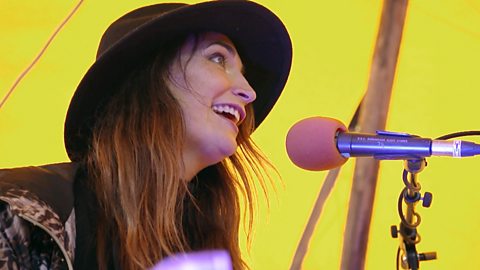Meet Kim and find out about her life as a promotions producer. Part of our Bitesize world of work series.
Kim Boak - Promotions producer
Being a promotion producer is basically trying to get as many eyes as possible back to BBC Bitesize that's our website and our social channels and trying to come up with things that create excitement that ultimately make people want to see our content.
On any other day I could be on the red carpet interviewing celebrities and another day I could be filming with animals it very much varies. I love reporting. My highlight was when I interviewed Harry Kane on and sports personality red carpet, and I was on a hype for days after, it was the best thing.
I heard about a sports reporter placement on my local radio station. I've managed to get an interview. I didn't think I had any chance of getting it but somehow I managed to get it. And it just opened my eyes so much. I was like a sponge that entire summer. Just soaking up everything that radio station, it was amazing. I absolutely loved it. After that, I worked as a reporter at the station and then I crossed into TV and worked at BBC Breakfast as a broadcast journalist.
My advice to anyone that is wanting to get a job in this industry is getting as much practical advice and support as you can, so whether that's the shadow day. Find out the names of people who work in the place that you might wanna works, whether it's the credits at the end of the TV show that you'd really want to work on.
The best bit of advice that I ever had was make your self indispensable. So grab it with both hands and make sure everyone knows your name. Make sure your making the cups of tea, you're coming up with those ideas, you're friendly, you're open.Another thing is that you get so many knock backs. I've lost count the amount of times I've been told you're not good enough, I've had contracts come to an end without warning. I've been out of work. I think because I've been so passionate about what I do, that's going to drive you to keep going and keeping myself backed up.
Working on this team, in particular, it's so important for multi-skilled. One of the best things I learnt to do is self-shoot and self-edit. Because you can be more reactive and you add value to you as a person. And I think being able to rely on yourself is so crucial. You don't need this in all roles in the media, but I thunk for ours in particular where you do need to shoot script, edit, deal with talent, eh. It's so important to have those multi-skills because you will just bring more to the job role your self.
My highlight was when I interviewed Harry Kane – on the Sports Personality red carpet – and I was on a high for days after.
- As a promotions producer, Kim needs to come up with exciting content to encourage people to look at the BBC Bitesize website and social channels
- Her job varies a lot – one day she could be interviewing celebrities on the red carpet, the next she could be filming with animals
- Kim got into her job by applying for a role as a sports reporter at her local radio station. After working as a reporter at the station, she moved to BBC Breakfast TV as a broadcast journalist
- Kim's top tip is try and do shadow days, and get as much practical advice and support as possible. The best bit of advice she ever had was to make herself indispensable: by making sure people know your name, making the cups of tea and coming up with lots of ideas
- It’s important to be multi-skilled in Kim’s role, though that isn’t necessary in every role in the media. Kim says being able to self-shoot and self-edit, script content and work with talent are all useful skills.

Kim's role is varied and involves creating a lot of content for digital platforms. Many of the skills Kim uses day to day are the same as a TV and film producer. TV and film producers plan and manage the business side of creating television programmes and films.
What to expect if you want to be a TV or film producer
- TV or film producer average salary: Variable. You may be self-employed/freelance
- TV or film producer typical working hours: 39 to 41 hours per week. You could work irregular hours and also away from home, and on evenings, weekends and bank holidays.
What qualifications do you need to be a TV or film producer?
You could get into this role via a university course or a college course such as a Level 3 Diploma or a T-level in Media, Broadcast and Production (England only). You can also do an apprenticeship, a broadcast training scheme or specialist training courses run by private training providers, or work towards the role.
Sources: LMI for All, National Careers Service, GOV.UK
This information is a guide and is constantly changing. Please check the National Careers Service website for the latest information and all the qualifications needed and the GOV.UK website for more on T-levels.
For careers advice in all parts of the UK visit: National Careers Service (England), nidirect (Northern Ireland), My World of Work (Scotland) and Careers Wales (Wales).


Find out more
Work experience in your area
Find work experience placements with Workfinder.
Tips and advice
Help with interviews, writing a CV and all things work experience related.


Clare: music news reporter. video
Clare is a music news reporter for BBC Radio 6 Music.

Careers A to Z: Find your perfect job
From actor to zoologist, find the right fit for you.

Riyadh: presenter and YouTuber. video
Riyadh Khalaf is a producer, presenter and content creator, amongst other things.
